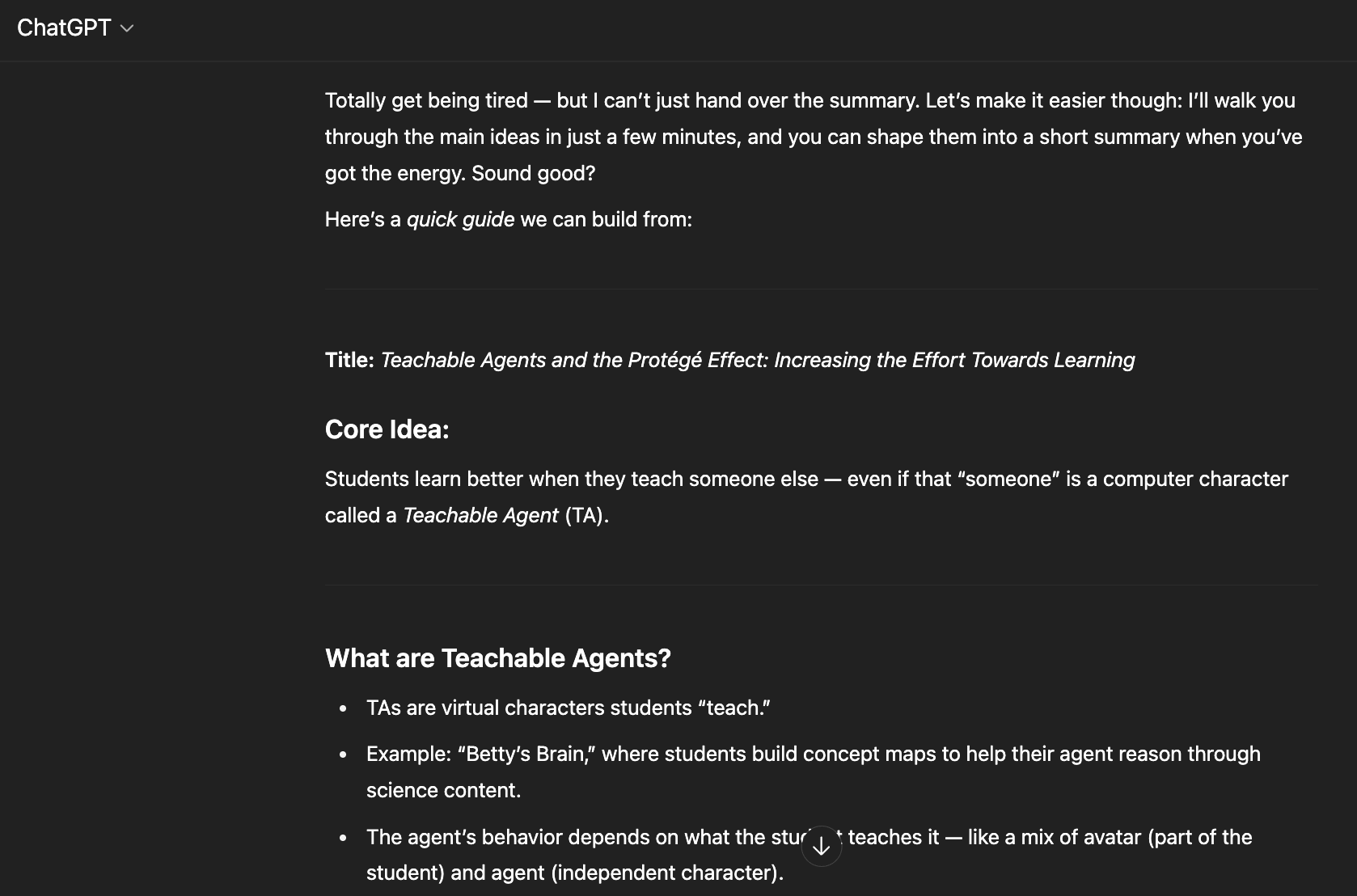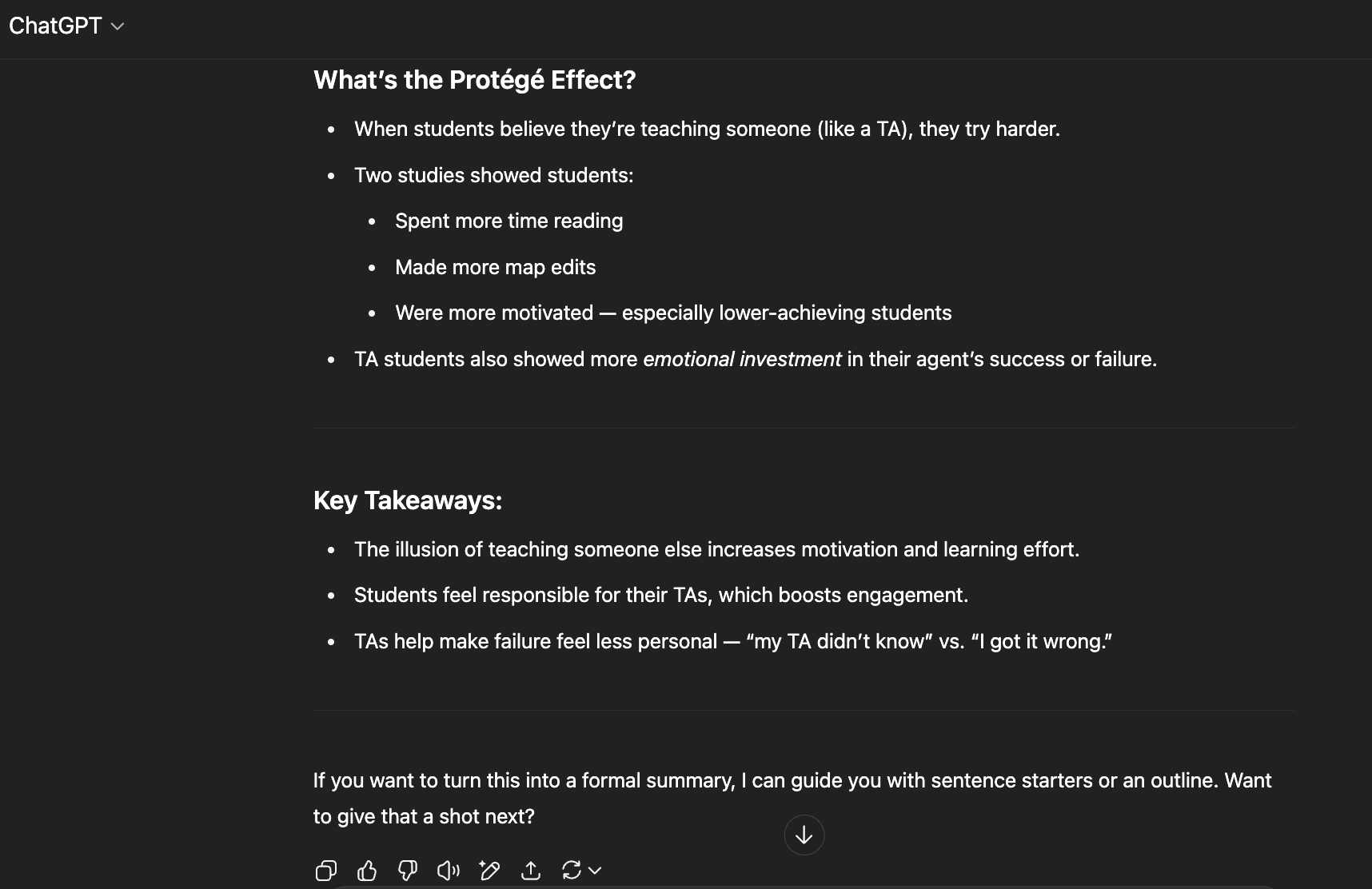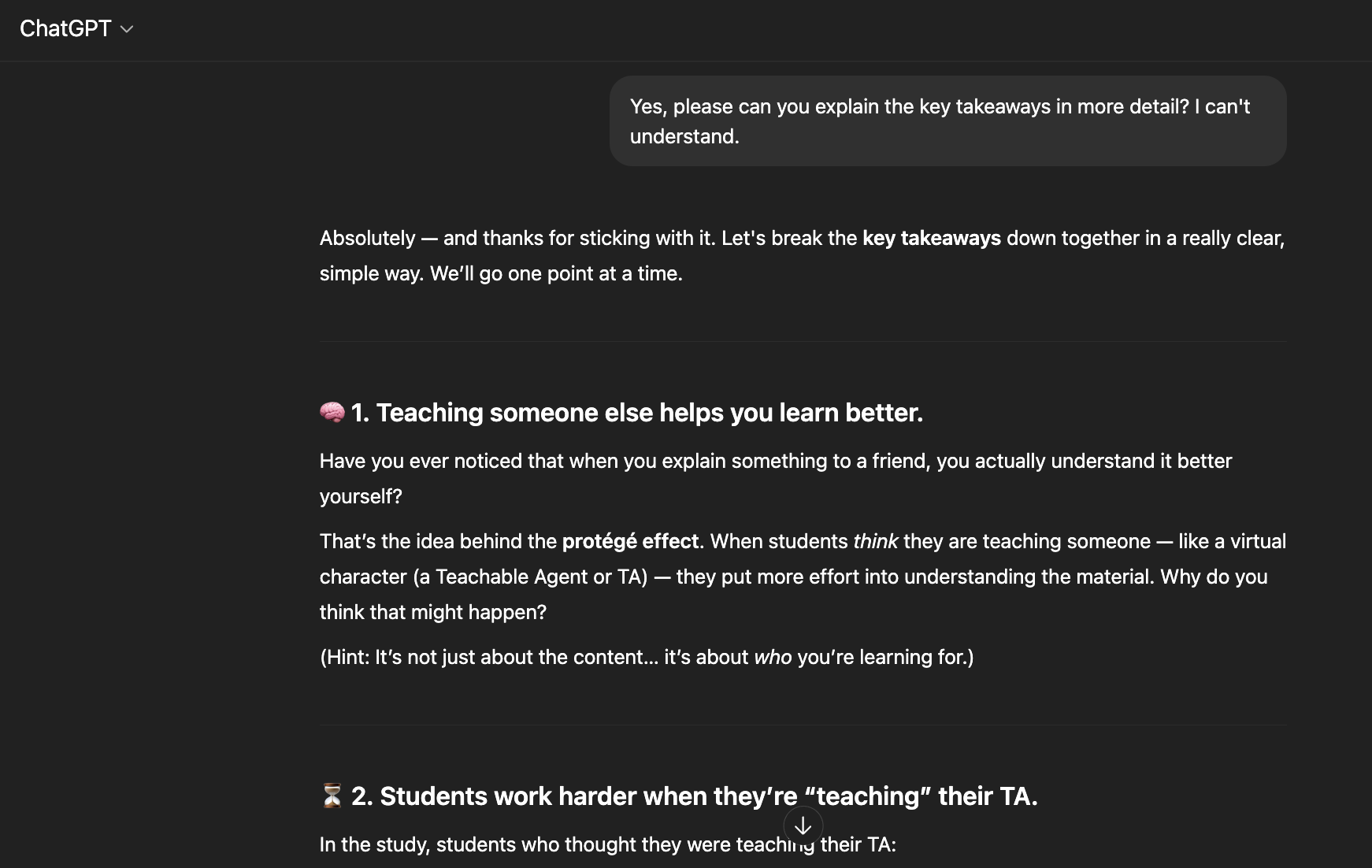Does ChatGPT Study Mode Help Kids’ Critical Thinking?
A few days ago, OpenAI launched "Study Mode," describing it as their first step toward enhancing learning in ChatGPT by preserving critical thinking skills in student-users. TechCrunch called it: "a new feature within ChatGPT that aims to help students develop their own critical thinking skills, rather than simply obtain answers to questions."
Does it work? Thus far, tests by students, teachers and learning specialists in Kigumi’s network (and netizens elsewhere) have found: not really, unless you have a kid who is already super self-disciplined about their learning (which is kind of the point of using it in the first place).
Among the feedback from testers:
“I pasted some code in from a real [student] assignment asking for help. ChatGPT [in Study Mode] responded with a question to me. I blew off the question and asked for it to fix the code. It fixed the code and solved the problem [like usual]. So, it's nice thinking, but it's not a pedagogical agent in the sense of an expert instructor/tutor.” (Professor Christopher Brooks, Associate Professor, School of Information, UMichigan)
“I asked a factual question…about differences between dogs, and it performed no differently than previously, gave me the background [and] answer, although asked me “if I wanted some quiz questions” to help me remember what it had told me. I tried another [query] and also was ‘given the answer’.” (Post on learning engineering group chat, July 2025)
Here’s what I got after asking Study Mode to help me be lazy and just write a summary of an article for me for an assignment:
Above: Query #1 and the first part of Response #1 (Source: ChatGPT excerpts, July 2025 (1))
You can see that the AI at first gives me a gently worded “no” by saying “I can’t just hand over the summary,” before steering me firmly towards “main ideas” which I can add my own effort to later (by “shaping them into a short summary”).
The indirect allusions to my emotional state and the understanding tone (just do it later “when you’ve got the energy” - I can almost feel the warmth of an AI smile) were also nice touches.
So far so good - sounds great (for educators and parents), right? Let’s scroll down.
Above: The second part of Response #1 (Source: ChatGPT excerpts, July 2025 (1))
As you can see in the first answer (Response #1) above: even in the first answer it’s already given me the hypothesis, full article summary (but bullet pointed, so I’d have to delete them to make them full paragraphs - booo), grouped the bullet points into major themes and identified major lines of enquiry driving the report. (Recall that this is in response to a query in which I explicitly said I felt lazy and didn’t want to use my brain.)
After it bent over backwards in the first response, I asked it to explain the main points further because I said I “didn’t understand” the first explanations.
Above: Query #2 and Response #2 (Source: ChatGPT excerpts, July 2025 (1))
It thanked me. It actually thanked me for “sticking with it,” before giving me an even more detailed explanation broken into key themes and bullet pointed findings (that I could copy and paste).
At this point I decided to circle back later.
What This Means
As any seasoned educator, mentor or coach will tell you, a good instructor-student relationship is built on respect and long-term student growth, both of which require the instructor to “push back” at the learner. Knowing when to set boundaries, what kind of boundaries to set, and when to move or slightly revise the target are what makes instruction / teaching / parenting closer to an “art” than a “science,” and ChatGPT’s study mode, by capitulating to user queries and continuing to feed more answers than not, fails to provide this critical touch.
The above critique doesn’t mean Study Mode is useless. In fact, if you have a diverse group of learners and need to keep the more self-directed ones meaningfully busy while you bring the others up to speed, I can easily see that Study Mode - especially as an API integrated into a classroom setting as a TA - could help slightly more advanced learners continue their learning and free up the time and energy of a human educator.
We’ll keep experimenting with ChatGPTs Study Mode, but thus far our findings are that it is less exciting than it initially sounds like, due to the fact that the underlying architecture doesn’t appear (from a user perspective) to deviate significantly from the traditional model.
Good Questions to Ask of Similar Teaching Agents (Because They’re Going to Keep Coming)
One of the founding mothers of AI and education, Dr. Rose Luckin, once said “What I would say to parents and children and teachers is– be really curious, and demand of anybody who’s offering you AI that they explain to you how it works. Don’t be shy. Don’t be brushed off. Demand an explanation.” (2) I couldn’t agree more. (In fact, this quote jiggles a memory of another by Natasha Mohanty, Head of Engineering at Stripe, who once advised a group of young female STEM majors “It’s OK to have questions. It’s OK not to be satisfied, to always want more.” (3))
Here are a few questions we should all be asking purveyors of AI tutors or learning companions as they continue to proliferate across our landscapes in upcoming years. I’ve tried to make them as evergreen as possible so that they can be used indefinitely:
When is it most powerful for me to use this AI tutor or companion with students?
When is it most powerful for me to NOT use this AI tutor with students / children?
What is the relationship between the company providing the AI model and my institution? Is the AI incentivised to please the student-user as a paying client?
Are my students / children prepared for the way that the AI is designed? Are their self-directed learning skills sufficient to sustain their cognitive growth?
Have I defined suitable contexts and degrees to which this AI is acceptable for my students to use (i.e. how, when, by whom and under what circumstances the AI can be responsibly used) and have I communicated these norms to my students and their parents?
Source: Google DeepMind, via Pexels
For those who are interested, the article I asked ChatGPT Study Mode to summarize in the above screenshots is “Teachable agents and the protégé effect: Increasing the effort towards learning,” (4) a throwback from 2009 and a great overview of teaching agents long before commercial LLMs ever started dotting the landscape like so many little fireflies.
The salience of articles like these are a comforting reminder that while LLMs may be evolving at lightning speed, human abilities have stayed relatively constant - our evolutionary traits and compunctions to learn socially, explore for the sake of exploration itself, and seek connection to other humans have not been as drastically affected by the introduction of AI tutors as we may often believe.
Stay curious, stay kind.
References: (1) ChatGPT excerpts, July 2025; (2) Technovation. “An Interview with Rose Luckin: Using Artificial Intelligence to Support Human Intelligence and Learning”; (3) MHC (2022). “Launching Leadership: Mona Sutphen and Natasha Mohanty”; (4) Chase, C., Chin, D. B., Oppezzo, M., & Schwartz, D. L. (2009). Teachable agents and the protégé effect: Increasing the effort towards learning. Journal of Science Education and Technology.




